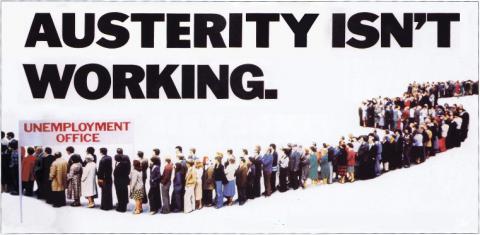What do Angela Merkel and Mitt Romney Have in Common? - Austerity unites right-wing Americans and Eurozone leaders
In May 2012, when Mitt Romney was campaigning for president, he made a statement that summed up his economic views - and came to define his run for office:
"There are 47 percent of the people who will vote for the president no matter what," he said. These people "are dependent upon government, who believe that they are victims, who believe the government has a responsibility to care for them . I'll never convince them they should take personal responsibility and care for their lives."
Germany's current leaders - and most of Europe's, as well - seem to fully agree with this philosophy. They treat Greece exactly as though the country fit Romney's description of that lazy, greedy 47 percent of Americans. And Greece's experience prefigures what looms elsewhere: like Romney, many European leaders appeal to their publics to embrace that perspective, often effectively. This involves leading the hard-working 53 percent to rise up and refuse to pay taxes that sustain the lazy and irresponsible, recipients of public support and overindulged public employees who deliver it. Romney's portrayal of the 47 percent matches, in words and tone, many European leaders' portrayal of Greeks (and also Portuguese, Spanish, Italian, Irish and the peoples of whatever other country happens to be in an economic rut.)
Within European nations, the Romneyesque perspective is dividing and and embittering citizens, particularly in the UK. The political philosophy behind the idea of a welfare state, which held that a capitalist system unable to provide decent, well-paying jobs to a significant portion of its people should use taxes to provide them with life's basics, is losing currency.
The welfare consensus was initially adopted because capitalists were trying to stave off threats of socialist alternatives: providing for the poor, they reasoned, would prevent citizens from sympathizing with Marxists, Communists, and other left-leaning groups. The consensus also grew out of shared mass experiences of capitalism's 1930s Great Depression and mass empathy with its victims, as well as Cold War-driven concerns that without a welfare state, the Soviet alternative would be all the more appealing. Finally, support for a welfare state reflected the wealth and incomes available to capitalists to support welfare states as means to maintain their socially dominant positions.
Over the last half-century, socialism and other anti-capitalist threats have been greatly weakened or compromised politically. Memories of the Great Depression have faded. Capitalists started to shift the burden of taxation off of businesses and the rich onto middle and lower income groups, undermining middle-class support for tax-based welfare systems.
At the same time, the private sector relocated production and distribution from capitalism's old centers (western Europe, north America, and Japan) to new hubs in China, India, Brazil, and other developing economies. As wages and salaries stagnated in the old centers, workers there borrowed more money and grew to resent their enhanced tax burdens.
The politicians whose role was largely to defend capitalism fumbled their way to austerity as the solution - an austerity justified by Romneyesque sociology.
As capitalists refocused investments on their new centers, their rising profits bought the political clout to win ever-lower taxes in the old. A race to the bottom began. And with tax revenues under attack, politicians everywhere responded with increased government borrowing. Debt and its manipulations - finance - thus became a major growth industry everywhere.
The explosion of debt postponed basic solutions to the problems accumulated by capitalism's evolution over recent decades. Despite stagnant wages, consumption grew and sustained demand because rising profits were recycled into loans to individuals, businesses and governments. This cycle imploded in 2008, when the global economy crashed and required trillions of dollars in public money to survive.
It was then that capitalism's postponed problems became urgently clear. Capitalist economies must continue their highly profitable relocation from old to new centers. They must deal with middle- and lower-income citizens in those old centers who can no longer borrow to postpone their declining economic and social conditions. They must somehow prevent those citizens from identifying capitalism as the problem and then moving politically to stop or reverse enterprises' relocation.
The politicians whose role was largely to defend this capitalist system then fumbled their way to austerity as the solution - an austerity justified by Romneyesque sociology.
Austerity policies pay the economic and social costs of global capitalism's relocation, its 2008 crash, and subsequent bailouts by raising mass-based taxes or reducing public services and employment or all of them. The philosophy of Romney's "47 percent" rationalizes austerity by defending the brave, new, righteous refusal of hard-working majorities to sustain minorities drunk on entitlements they don't deserve.
Unsurprisingly, capitalism seeks allies among better-off, largely private-sector workers, implicitly (and falsely) promising to protect them from what austerities already do to public employees and welfare recipients.
Against this version of divide-and-conquer politics, a new left is rising. Syriza in Greece, Podemos in Spain, and Bernie Sanders' presidential drive in the US: all are among new initiatives that begin to question and challenge capitalism in its old centers. These protagonists are gearing up for what will likely be a conflict central to the 21st century.
[Richard D. Wolff is a professor of Economics, Emeritus at the University of Massachusetts, Amherst, and a visiting professor in International Affairs at the New School University in New York. He has published many articles and books including Occupy the Economy: Challenging Capitalism and Democracy at Work: A Cure for Capitalism.]
Thanks to the author for sending his column to Portside.


Spread the word